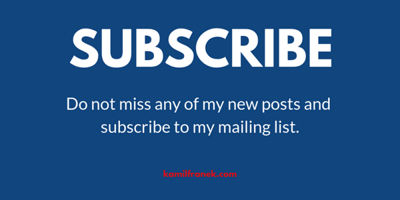How Google News Makes Money: Business Model Explained
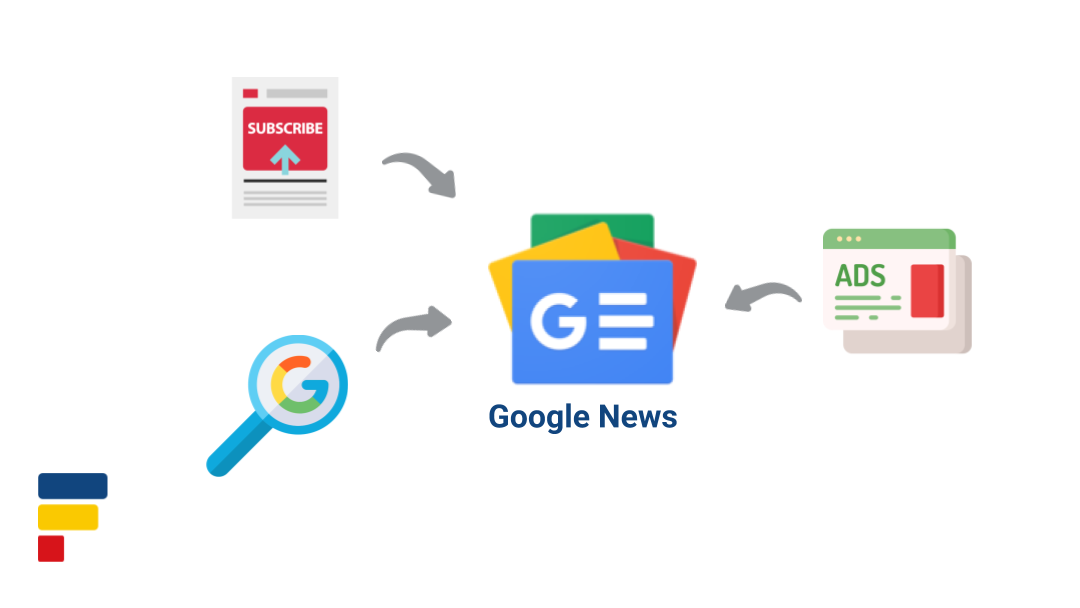
Google News is a very successful news aggregation service. It aggregates news headlines from many publishers into topics and categories. It then serves it to the users either within the mobile or web application or as a part of Google Search results. It is successful in terms of the number of users, but what is the Google News business model? Does Google News make money at all?
Google News application (both mobile & web app) does not currently make any significant money for Google. But if we include as part of Google News also “news” driven search results, then advertising revenue from these searches is estimated to be around $1bn a year worldwide.
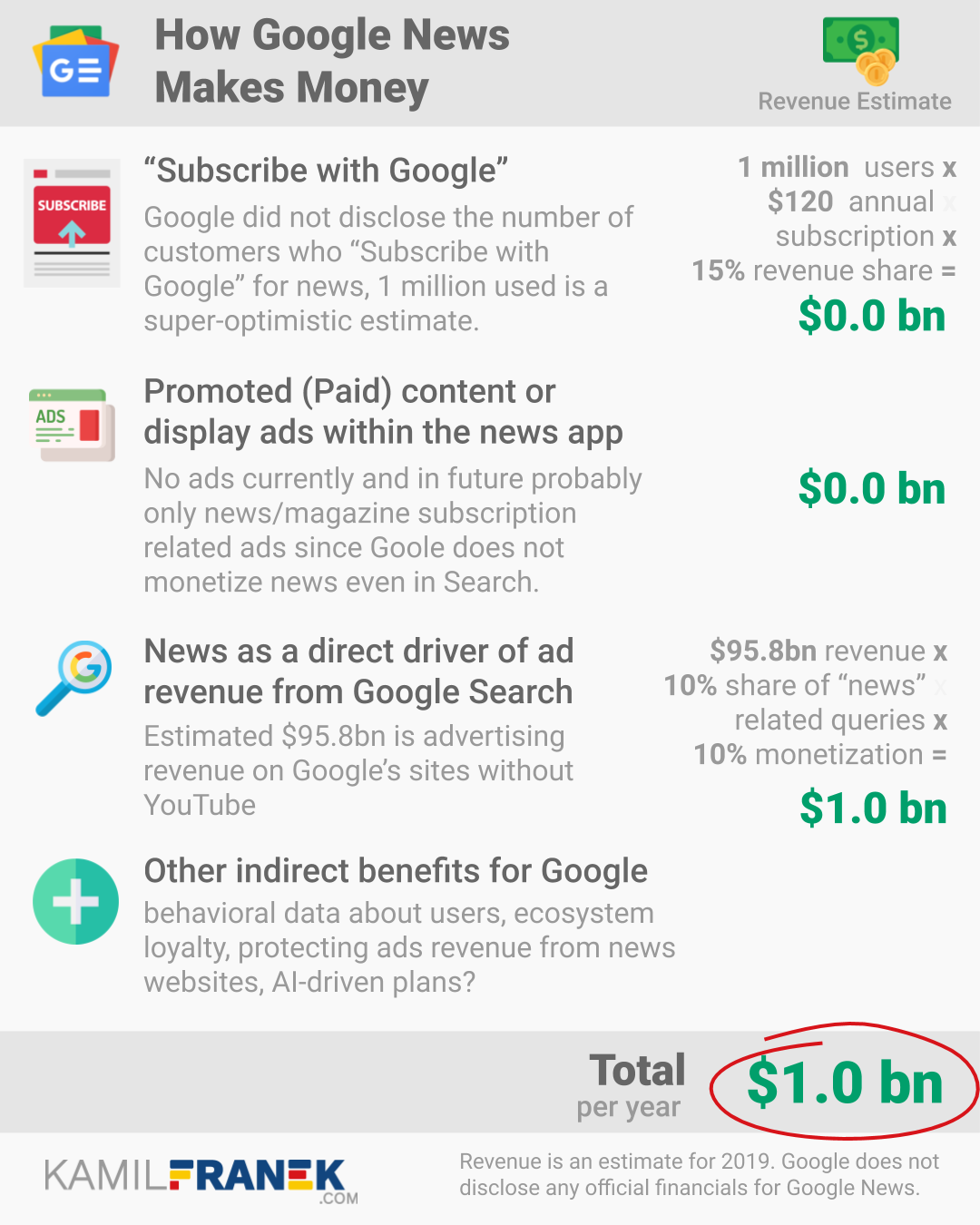
As is evident from my estimates showed in the infographic above, Google News App is currently not earning any significant money for Google. The only noticeable revenue associated with the news is revenue from a small proportion of monetized “news” related search results. In this article, I will walk you through my estimated revenue for Google News and also provide insight into potential future business models Google News might pursue. Can some of them turn into significant money makers?
I will also offer my view on the disagreement between news publishers and Google concerting news content. News industry representatives claim that Google is making a lot of money from the news in their expense, and they are pushing politicians to make Google pay for the right to show links to news articles. Are these news industry demands fair?
⚙️ How Google News Works
Before we jump into the core topic for this article, which is how Google News business model work and its revenue estimate, let me recap what Google News is and how it works.
Google News is a news aggregator. It is a service that searches through thousands of news resources and organizes them into different categories like U.S., World, Business, Technology, Entertainment, or Sports. These categories are customized for a given country but not specifically for you. There is also the category “For you,” where Google News algorithm chooses topics just for you based on your interest and google search history.
Google news shows you pictures and headlines of the articles. If you click on it, it will redirect you to the publisher’s website where you can access its full version.
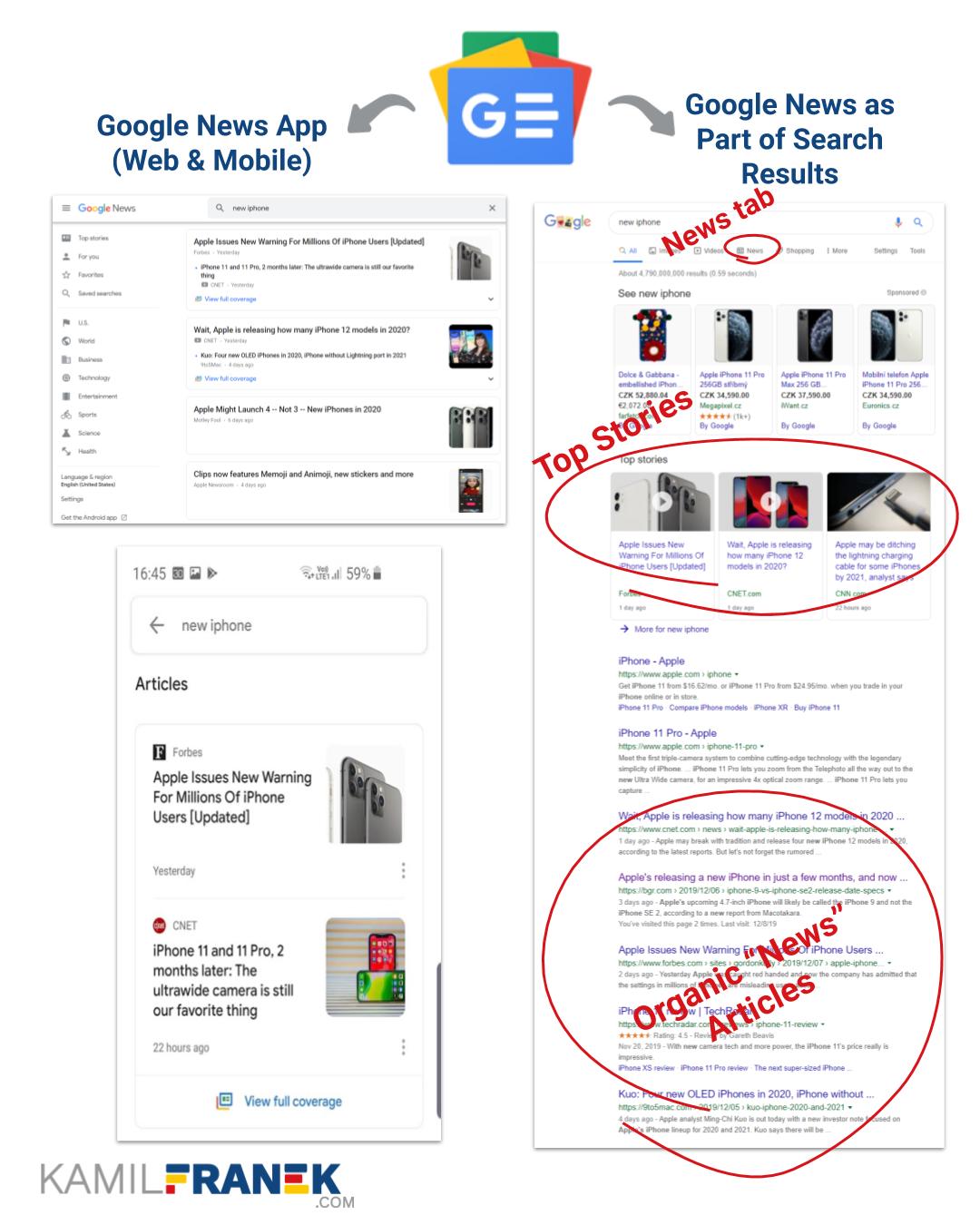
Google News has two different ways of how to access it. One way is to access it through the web or mobile application that will show you all the categories as I described and serves as your daily news provider. Here is a short video from Google explaining the main benefits.
Another way to access Google News is through the standard Google Search web page. Although you can search articles also within the Google News app, and it will give you nearly identical results, Google Search interface is far easier to use when you are searching for more specific news topics. It also allows you to discover older articles.
Google uses several different formats of how it shows articles withing Search Results. They can show up as standard search result items, or Google will show you the “Top Stories” carousel with news content. And if you want to see only news without anything else, you can click on the “News” tab and see only news search results.
So to recap, when I talk about Google News, it includes all of the following:
- Google News Application
- mobile app (both for Android & iOS)
- web app (news.google.com)
- News withing standard Google Search results
- a standard item in search results
- top stories carousel
- news tab in search results
I think that’s enough for a quick introduction, now let’s have a look at different business models google news can utilize to make money.
🔵How Google News Makes Money with “Subscribe with Google” + Revenue Estimate
Google News mobile & web app does not include full news articles. It is just headlines and accompanying photos that are organized for you. If you click on an article, it redirects you to the publisher’s website. Some of those news publishers (like Wall Street Journal or New York Times) will allow you to read only a limited number of articles before you will hit a paywall and will be required to subscribe to continue to have access to it.
Subscribing to the newspapers can be a tedious process. Therefore Google found a way how to make it easier for users to subscribe to digital publications without complicated signup and payment process. They introduced Subscribe with Google option, which will allow you to subscribe and pay only in a few clicks, and you won’t even need to remember any new passwords, as long as you are signed into Google. Test results for Subscribe with Google showed 30% better results than the standard sign-up process.
How Much Money Does Google News Maks from “Subscribe with Google” Option?
Let’s try to estimate how much can Google be earning from Subscribe with Google. I will intentionally use very optimistic assumptions to show that even if we are super optimistic, the revenue is still negligible.

My optimistic estimate for revenue Google is earning from “Subscribe with Google” is $18 million. It is nothing compared to $137bn of Google’s (Alphabet’s) annual revenue, and even if we take into account that the number of users might grow in future years, this revenue stream will probably stay immaterial for the foreseeable future.
Still, the fact that it does not make money doesn’t mean that it is not a smart move for Google. Google loves when you are signed to Google account on all of your devices because they can then use your behavioral data for more relevant (and more profitable) add targeting. “Subscribe with Google” is just another reason why users might decide to stay signed in.
He is a quick summary of inputs I based it on. To estimate revenue from “Subscribe with Google,” we need to know:
-
The number of active subscriptions people purchased through Google News: My estimate 1 million is based on Apple News+ subscription number that I adjusted to take into account the greater popularity of Android vs. Apple phones worldwide and also for lower expected relative adoption of Google News among Android users.
-
The annual price of average subscription: I used median digital subscription price $10
-
What proportion of total subscription price is a commission for Google?: I used 15%, which is an official number for subscriptions over 12 months on Google Play.
We will get to our estimate for total revenue for Subscribe with Google by merely multiplying those numbers above.
- 1 million users
- x 120$ a year
- x 15% profit share for google
- = $18 million
For those of you that would like more detailed insight into my reasonings behind my assumptions, here are a few paragraphs for each of them.
Number of subscriptions (1 million)
To be able to estimate revenue from “Subscribe with Google,” we have to have an idea about how much people currently are subscribed to newspapers through Google. Google does not disclose any numbers about this, so we will have to use some benchmarks.
Apple News+ is a premium service of Apple that allows getting access to multiple publications for a fixed monthly subscription. It is not the same service as Subscribe with Google but looks like a better deal. Therefore we will use it as an optimistic estimate. Apple News+ reached 0.2 million subscribers in just 48 hours after service went live.
The company did not disclose fresher numbers since that, but based on some reports, it looks that they were not able to grow it much more above the initial amount. The number of Apple News+ subscribers could be around 0.3-0.4 million worldwide.
But we can’t just say that our estimate about “Subscribe with Google” subscription would be the same as for Apple News+. We will have to adjust it to reflect the differences between Apple & Android. There are two competing forces in place here to consider:
-
Google News has more potential customers because Android is a much more popular platform in a number of users. For every iPhone, there is 3.3 out there. Therefore, if “Subscribe with Google” would have the same adoption rate as Apple News Plus, the service would have around 1 million to 1.3 million users.
-
Apple’s customers adopt additional services at a much higher rate than Android customers. One example of this is Apple Pay vs. Google Pay, where even though Android is a dominant platform outside the US, Google Pay lags behind Apple Pay there. That means that the adoption rate for Android would have to be reduced for our estimate. The adoption rate will also be influenced by Apple News+ being the better deal because it offers multiple newspapers and magazines for the price of one. My guess would be to apply a 50% multiplier to Android users, but since I want this estimate to be on a more optimist side, I will use only 75%.
If we put the above together, we will arrive at an optimistic estimate of a number of people who used “Subscribe with Google” of 1 million.
- 0.4 million users (Apple News+ benchmark)
- x 3.3 android factor
- x 0.75 lower adoption rate (optimistic) for Adnroid users
- = 1.0 million users
Annual price of newspaper subscription ($120)
We can just check what is a usual monthly subscription and multiply it by twelve months. Based on the analysis of American Press Institute median digital subscription in the US is $10 a month.
$10 a month average subscription x 12 months = $120 avarege annual subscrition
Google’s commission from subscriptions
This assumption is based on Google Play’s revenue sharing that is in place right now. Google takes 30% cut from in-app payment within the Google Play platform and for subscriptions after 12 months 15%.
Revenue sharing for “Subscribe with Google” might be different from Google Play one. And there is a reason to believe that Google might have sweetened the deal temporarily to drive adoption. Especially for the larger, more established publishers.
But again, I am trying to make an estimate on the more optimistic side for Google, so let’s use a standard 15% share.
🔴 How and How Much Google News Might Make Money from Promoted Articles or Paid Advertising in the App
Right now, there are no apps or paid promotions within the Google News app, so estimating revenue coming from it is quite easy. There is none.
There might be some potential for revenue for the future. Both Apple News and Flipboard (another competitor with around 100 million users) use ads and generate some revenue from it. Google can also charge publishers to promote some of their posts to the top of Google News feed. However, I haven’t heard of any plans to do that, and I don’t think it will happen any time soon.

Just try to search for some news related stuff within Google Search. You will hardly find any ads there. Google is simply no monetizing news-related queries. And it is understandable because Google Search ads are intent-driven, and they are customized to what you are looking for. If you are looking for product reviews or for car repair shops near you, you will see many ads. But if you will search for some news related stuff, you will hardly see any ads at all.
If you add into account news industry pressure on Google to share some revenue with them, I don’t think that Google will jump in Google News monetization anytime soon. And it might not be worth it.
Estimated revenue from potential Google News monetization with ads and promoted articles
But lets at least look at some rough estimates of how much money could Google News bring if Google decides to monetize it through ads or sponsored posts.
We know that the number of users Google News has is around 280 million (it is an estimate). So to make a revenue estimate, we need to know how much it can potentially earn from one user a year. Will it be similar to what social media sites are earning from their users? It is safe to assume it will be lower both because people, on average, spend less time reading the news than they spend time scrolling through their social feeds + news are not so attractive for advertisers. It is hard to show relevant ads next to the news content.
But there are publicly available data that can help us to get to a more precise estimate than benchmarking it to revenue per user of social media sites.
Firstly, the New Your Times annual report shows that NYT earned $238 million from digital advertising. Given their estimated number of users is 117m (and nearly all of them digital). $238 million divided by 117 million users gives us revenue of $2 a year per unique user.
New York Times is an established publisher. Therefore let’s try to look at some other digital-only competitors that are more close to what Google News is doing. Based on the quote below, we also have insight into what is rough revenue of Flipboard, which has 100 million uniques users and earns money through advertising.
“To get a company of 160-some people to profitability, you need about somewhere in the range of $50-$80 million in revenue annually,” he says. “We are well over more than halfway there.”
—Mike McCues, CEO & Co-founder of Flipboard, as reported by fastcompany.com
Based on the comment above and 100 million unique visitors of Flipboard, it means that Flipboard’s revenue might be between $30 to $40 million annually and therefore is earning around $0.3 to $0.5 per user a year.
I think NYT and Flipboard values above give us a reliable range for where we could expect Google News income per user to be. Of course, this will happen only if Google decides to monetize it through ads, which I don’t expect to happen soon. If we just average those two benchmarks, we get expected revenue per user $1.2 annually. If we multiply $1.2 x 280m users for Google News, we get estimated revenue from advertising and promoted articles 0.34bn a year.
⚪ How Google News Makes Money from the News in Standard Search Results
Google News is not only a mobile and web application. Google News is also part of standard search results. Google shows news within its search results in several different ways:
- standard search results
- top stories carousel
- separate “news” tab that shows only news search results
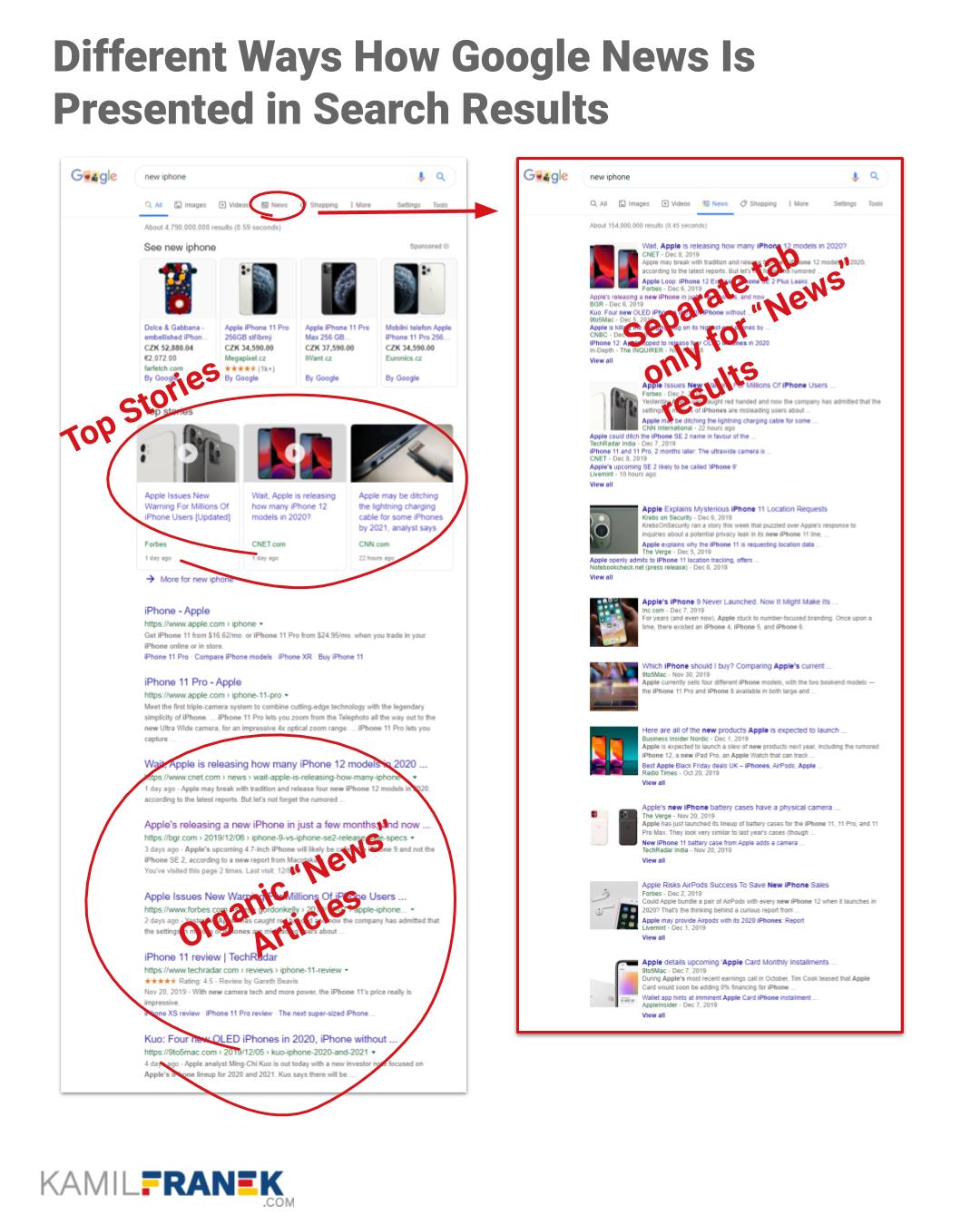
Google also started to show “Articles for You’ section on the home page of a mobile version of Google Chrome, which can also be seen as another interface for Google News content.
How much money Google earns from news-related search results
Let me walk you through how Google News makes money from news-related search results. But before I do that, I need to clarify what I mean by news related search query.
Google sometimes shows news articles within the search result. Based on the “study” (I will explain later why I use quotations) by News Media Alliance, 16% of search results are news articles. But some of those articles are included in search queries that are not news related.
For example, if you google “how much revenue is Alphabet’s earning,” the first few results are charts or data-heavy summaries of their financial results. You will see also a couple of news articles by reputable publishers at the end of the results.
In my view, this is not a news-related search result because the user was not looking for the news article in the first place. He or she was looking for data about or more detail break down of Google revenue, not a newspaper article about it by the New York Times or Guadian, which are just reporting on it based on other official financials of Google. If this search query result did not contain these articles, the user would still get what he wanted.
What I mean by news related search is when user intent is to search for the news related topics like “us china trade war” or “Larry Page stepped down.” There is a significant proportion of articles from reputable news publishers in these results because that is what users want when they put those queries into the search bar.
If a share of all news in search results in 16%, then share of news-related search queries will be lower. I went through the list of top 100 Google search queries and found that share of news-related search traffic was 10%, and that is number I will use for my estimate of how much money Google news earn from news-related search.
My estimate of how much money Google makes from news-related searches is $1 billion.

Here is a quick summary of how I arrived at this number and what inputs I used:
- I assumed that 10% of search traffic is news-related. This number is based on proportion of news related queries in the top 100 Google search queries
- Google’s total forecasted revenue from advertising for 2019 (with YouTube revenue excluded) is $95.8 billion.
- Most of the “news” related search queries do not show any ads, and therefore Google is not earning any money from it. But there might be some queries that lie somewhere between product search and news. An example of this is a query “new iPhone,” which combines news articles and product links. The number of these borderline queries is minimal, but we need to take them into account, so my assumption is that that 10% of news-related queries are monetized.
By putting all those inputs together, we will arrive at my estimate.
- $95.8 bn advertising revenue from Google Search
- x 10% share of “news” related queries
- x 10% news related queries are monetized
- = $0.96 bn estimate annual revenue from Google News within Search results
Details of estimate by News Media Alliance that Google revenue from the news content is $4.7 billion a year and several reasons why this estimate is flawed
Recently shortly before U.S. House Committee On The Judiciary hearing about free and diverse press, News Media Alliance which is an trade association representing many newspaper in the United States and Canada, published a document (they call it “study” for some to me unknown reasons) which claimed that Google revenue from news content is estimated at $4.7 billion in 2018.
This “study” has some fundamental flaws. Google and news publishers hardly agree on anything, but when this study was published, it received massive backlash from both Google and also many journalists. Many agreed that this “study” and numbers in it were bogus , flimsy, imaginary or fuzzy
Let me summarize the reasoning for this $4.7bn estimate that David Chavern, CEO of News Media Alliance, even cited in front of the US senate committee as a valid number, probably hoping that nobody will really check how this number was put together.
- In 2008 Google vice president Marissa Mayer mentioned during a lunch session at Fortune’s Brainstorm Tech conference that Google News value for Google is around $100 million. Even though Google News did no show ads, Marrissa argued that it drives users to search other stuff on Google that shows ads.
- in 2008 $100m was 0.7% of Google Search revenue, therefore if applied to 2018 search revenue (it was $96bn), “study” forecasted revenue $0.67bn in 2018.
- “Study” assumed that $0.67bn is only related to the Google News app and not google news in search results. And because publishers get 6x more traffic from Google Search than Google News, “study” added 6x$0.67bn as revenue from news from Google Search to original $0.67bn. Together it makes $4.7bn
- finally, they call this estimate straightforward and conservative.
These are the main flaws of their estimate of revenue Google earns from Google News as I see it :
- obviously, the first thing is that using a number mentioned during lunch without any further backup or detail how google arrived at it and what it really represents is highly questionable by itself
- Secondly, if this over the lunch estimate is ten years old, it becomes even more worthless
- And even if we accept the above (which I don’t), it would mean annual revenue only $0.67 bn, which is more or less in line with my estimate. What the “study” does is that it uses some flawed logic and assumes that this 0.67bn needs to be again multiplied by 7, which brings it to total revenue of 4.7bn. This does not make any sense because if the estimate from 2008 of $0.1 bn was correct it with high probability included all Google news, including news in Google search results.
- The “study” also totally ignores the fact that Google does not show any ads at all on news related searches
I would be the last person to disregard calculation just because it is rough and straightforward. Simple, back of the envelope estimates can provide immense value, but it has to be based on some proper inputs & logic. This NMA “study” doesn’t offer neither of that.
⚫ What Other Indirect Benefits Does Google News Bring to Google and Alphabet.
As I’ve shown you above, Google News does not earn any money directly. The only revenue that can be attributed to Google News is ad income from some of the borderline “news” related queries where Google shows ads. These queries are quite rare.
But Google News has value for Google in other ways than direct revenue generation. Here is a list of some of them:
- it drives traffic to standard Google Search for other no-news queries that earn money because users tend to stick to the tools they already know
- Google News is also another way how Google collects data about what are people doing online, which helps them with better ads targeting outside Google News
- just the fact that Google News users need to be logged in to their Google accounts to see their customized news is immensely valuable to Google
- Having a news aggregator also might be important as a defensive strategy against the disruption of Google’s digital advertising business on news publisher sites. Other news aggregator services that would move news content from publisher websites into some mobile app that would show add directly in the app could mean less revenue for Google.
⚖️ How Much Revenue Google Pay Makes (and Could Make) Compared to Total Alphabet Inc. Revenue
In the chart below, you can hardly see the dark blue bar that represents how much from $137bn of the total revenue of Alphabet is attributable to Google News in 2018.
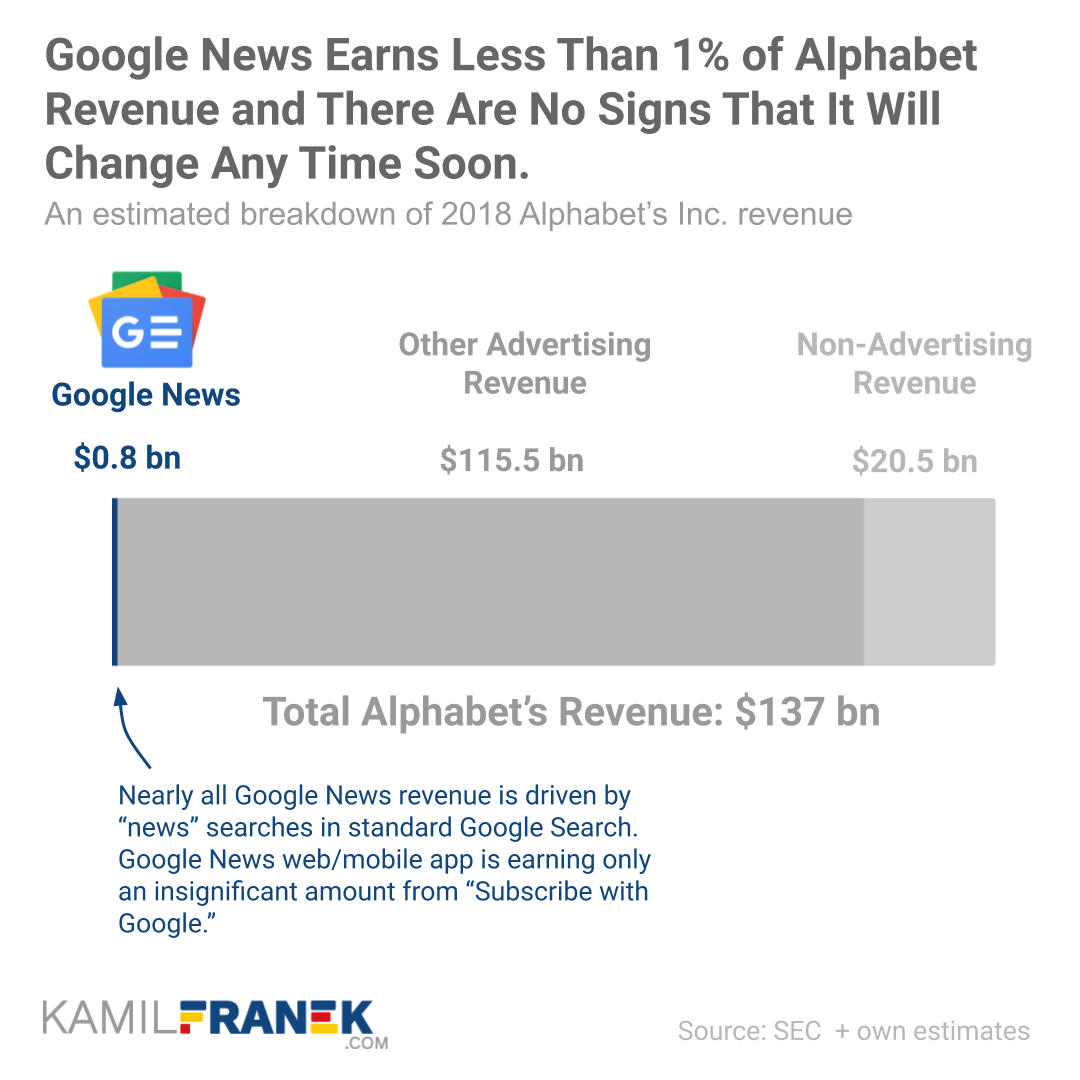
And what is essential is that the vast majority of that revenue comes from the news in Google Search, not the Google News app.
If you want to explore Google’s (Alphabet’s) Annual Financial results then I recommend my article reviewing their recent annual report.
🧑📊 How Many Users Does Google News Have and How It Compares to Its Competitors
I have already mentioned that Google is a dominant news aggregator service, and I estimated its number of users around 280 million, making it by far the top news aggregator platform in terms of a number of users.
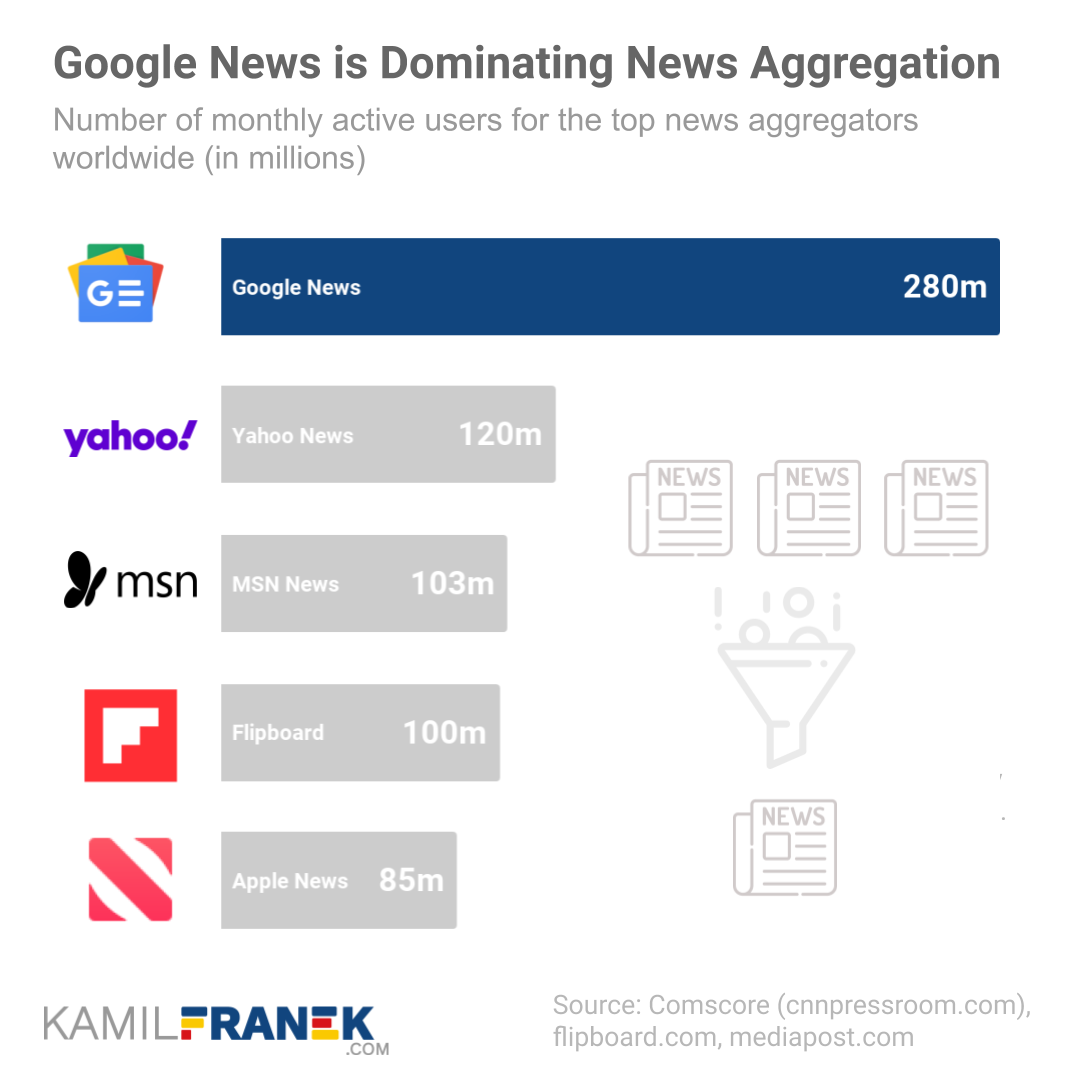
Google News’s most significant competitor is Yahoo News, with 120 million users, less than half of what Google News has. For some of the people, it might be surprised that Microsoft’s msn.com still holds third place among the most popular news aggregators. Flipboard on the fourth position is the only “independent” provider. All of the other players are the leading tech companies for which news aggregation is the core business.
Data in the charts are from Comscore or from announcements done directly by Flipboard and Apple. The only one that I had to estimate was a number of users for Google News. An estimate of 280 million users is based on the relationship of traffic coming from these aggregators to Parse.ly network. I admit that there is significant uncertainty about how high the number of Google News users is. However, even the most conservative number would give us 180 million, which would still make it the biggest news aggregator with more unique users than any other news outlet out there.
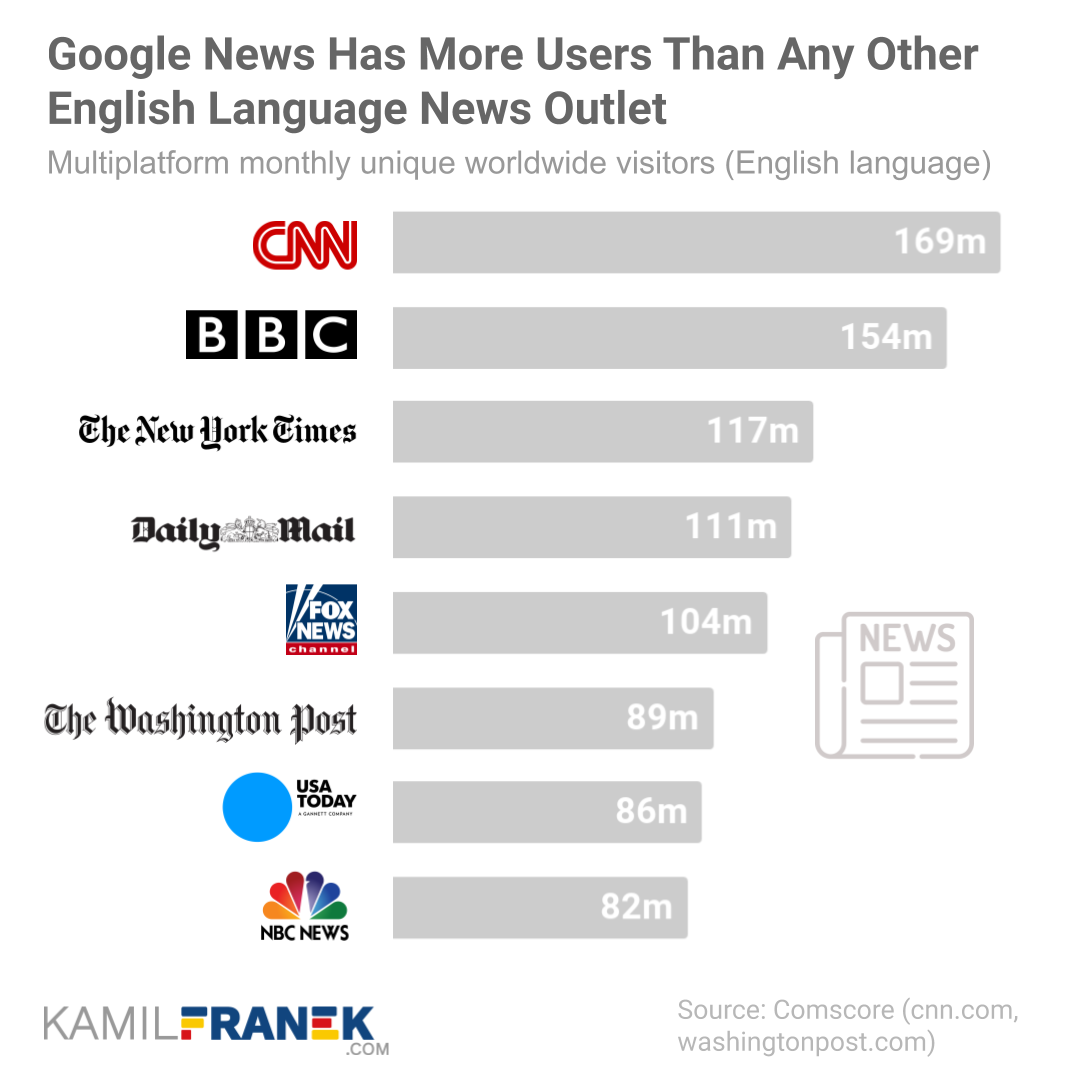
The chart above shows the biggest English language news outlets by monthly unique visitors both from mobile and desktop. The biggest one is CNN (169m) followed by BBC (154m). New York Times is in third place with 117 million monthly unique users.
It is essential to realize that only a small portion of those users are subscribers. Most of the users visit probably just one or two articles a month.
For example, the New York Times had at the end of 2018 4.3 million subscriptions, and most of them (3.4 million) were digital-only.
🦹♂️📰 Google News vs. News Publishers: Is Google Really the Villain Which Is Siphoning Revenue from News Industry?
News publishers, journalists, and organizations lobbying on behalf of them like News Media Alliance frame the story of news publishers decreasing revenue as a story of villains Google & Facebook channeling away advertising revenue by scrapping news content without approval and earning money from it. They usually end this story with the punchline that because of Google & Facebook, they are not able to fulfill the function of a democratic free press, which is so crucial for democracy.
It is a nice story, and some of the facts like that the free independent press is crucial for democracy, that the news publishers revenue is decreasing and that Google & Facebook revenue is going up are true, but the causality is way off.
Let me expand on it and share with you my thought and reasoning why I don’t think news industry concentration on Google and Facebook as the main villain is a story based on reality.
Real Villain is Not Google or Facebook
The unfortunate truth is that the old advertising revenue that the news industry lost in the last couple of years is never going back. News publishers are right that revenue of Facebook and Google increased at the same time as news industry advertising revenue decreased, but correlation does not mean causation.
The real reason why the advertising revenue of news publishers decreased is that the internet came along and disrupted the historical very profitable business model, news publishers got accustomed to.
The news industry was disrupted because the internet looks to be a far more efficient way of how advertisers can reach their customers than old newspapers business.
The Internet offers so many new ways how to advertise on different social media sites, within online games, on various blogs like this one or within online video content. With so many options, competition in how companies could spend their advertising budgets is fierce.
The old revenue from advertising the news publishers were used to, is not coming back
Yes, Google and Facebook reaped a big chunk of digital advertising, but they did not cause a decrease in offline advertising. Therefore even if Google and Facebook were forced by the government to split into 20 small companies, newspaper revenue would not grow back where it was.
With Google or without it, digital advertising is a much more competitive environment, and sooner the news publishers realize that old revenue is never coming back, the better.
They have already lost the old revenue. Now they will have to find new revenue and forget about the old one.
Therefore publishers would be far well off if they did not spend their valuable time and resources on lobbying against Google and Facebook to gain some advantage from government, but instead focus on new revenue sources and making sure that they provide news content in a way that today’s customer’s like and in a format they prefer.
Because if they don’t do embrace mobile and more visual forms of news, somebody else will. If there were not Google, it would be some other innovative company.
Few examples that showed that news publishers like the fact that Google & Facebook “steal” their content and publishers benefit from it.
News publishers often complain that Google is freeriding on their content by serving their customers links to news articles with short snippets. They wrongly connect this to news industry advertising revenue decrease.
The problem with this is that it does not explain how exactly is Google hurting news publishers by showing links to their articles. Because to read the article, customers have to click on it. This click will take the reader to a publisher website where publishers can monetize this visit by showing advertising or nudging visitors to subscribe to their digital editions.
Google, on the other hand, is not even showing ads around news content, so how exactly is this practice of sending traffic of 10bn clicks a month from Google Search or Google News to news publishers hurting them?
What is more, Google allows each publisher to opt-out from Google Search and Google News. If they do so, Google wills top showing links to their articles. Recently as a reaction to EU copyright regulation, Google offers publishers far more customizable option about snippets and pictures that can Google show alongside the links.
The answer is simple, links do not hurt them, and news publishers benefit from the traffic they generate. News publishers proved this in several instances where they tried to push Google to pay them for showing links to their sites. When Google refused, they asked Google to include the links for free.
Germany & Belgium example
You can read about another “experiment” in Germany when one of the biggest news publisher Axel Springer has canceled their experiment to block Google from running snippets of articles from its newspapers just after several weeks because traffic to their site decreased.
Spain example
In Spain in 2014 newspaper publishers’ association AEDE, successfully lobbied for a law that would require services that post links and article excerpts to pay a fee to publishers. The law went even so far that it did not allow publishers to opt-out and offer their content to free.
Before the law came into practice, Google announced that they are forced to close down the Google News in Spain because of that. AEDE did not like it at all, and based on the article below, even openly said the law that they have supported resulted in a negative impact on citizens and Spanish companies.
“AEDE said the closure of Google News “without a doubt will have a negative impact on citizens and Spanish companies,” and called for authorities to get involved. “AEDE requires the intervention of the Spanish and EU authorities and the competition authorities to protect the rights of citizens and businesses,” it said.”
Based on some studies, it looks that nobody really benefited in Spain from this law, and it looks that the smaller the publishers that bigger drop in traffic they experienced after Google News shut down in Spain.
This document from News Media Alliance suggests that the drop in traffic was small, and it was offset by direct traffic to publishers’ main sites, which is more valuable for publishers. But that again might be true only big publishers.
France recent law implementing EU copyright directive
The most recent example is from France, which was the first country to implement EU copyright regulation into their “copyright law.” The law is valid since October 2019.
France was a big proponent of the new EU regulation, and based on the study the France publishers commissioned, news publishers lost €250 million and €320 million euros of revenue per year thanks to Google and Facebook. I did not see the details of thees estimate, but it looks too high, and since it is the news industry who commissioned this study, I would no take it too seriously.
“Because of changes in copyright law in France, Google Search will not display text snippets or image thumbnails for affected European press publications in France, unless the website has implemented meta tags to permit search previews.”
Google did not surprise with their announcement that they will as a default option, start showing only bare links in their search results without pictures and snippets, but Google will allow publishers to opt-in into more rich content if they chose to do so.
They also introduced a new set of tools for publishers and other site owners to allow better control over which data can and cannot be shown in a rich snippet of the article, which is clearly a step in the right direction.
Based on experience from other countries, I am quite confident that most of the publishers will eventually opt-in simply because they earn more money this way.
Google is not a saint. Their market dominance in certain areas is a big issue.
Although I think than in the news publishers vs. Google disagreement facts and logic is on the side of Google, I don’t think that Google and other big tech companies are saints and government and other players should clear the way for them.
Clearly, antimonopoly watchdogs failed in stopping some of the acquisition that Google and Facebook did in the past. Letting companies limit competition by buying out the new entrants should not be allowed, that is one of the core intents of antitrust laws and why big acquisitions are subject to regulatory approval.
Also, there are worries that Google’s real revenue sharing percentage for ads that it is serving on publisher’s websites is not in line with the revenue share Google is claiming it is taking. Google publicly shows only some Ad Sense splits where Google keeps 32%, and 68% pays to publishers. The problem is that Google does not disclose this number fo mobile ads, which are now a big chunk of traffic. Also, for bigger publishers, Google has an individual agreement with much higher shares.
But by looking at Google’s (Alphabet’s) annual report, we can see that it is in line with Google’s claim. In 2018, the percentage of the Traffic acquisition cost for Google Network Members’ sites, which also includes news publishers, was 71% of revenue from Google Network Members sites.
In 2016, the Guardian had purchased its own ad inventory to try and assess where the money was spent across the entire advertising supply chain, and the result was surprising. In extreme cases, the Guardian received only 30% of add-spend. It was an extreme case, but analysis by eMarketer shows that 40% is quite normal.
So who is right? Usually, during discussions and public appearances, Google repeats again and again that it pays publishers 70%+ share of revenue it receives. On the other hand, publishers and news industry representatives claim they receive only 40% from total ad spend.
It seems that both sides are right because the numbers are not comparable. Then it is not a surprise that Google and publishers don’t agree with each other because each side is measuring something different, and it is like comparing apple to oranges.
70% share Google is using is how much revenue Google receives for placement on publishers’ websites is paid to publishers.
A 40% number represents how much from the total-add budgets of advertising ends up in the hands of publishers.
When publishers don’t buy ads directly from Google, they use programmatic ads platforms where Google is just one of the partners. Programmatic ads are thought to be far more efficient overall, but part of the money does not reach digital publishers because advertisers have to pay programmatic ads platform for their services and also for 3rd party data they might use for better ads targeting. It does not have to mean that publishers receive less money, but % is lower than if they advertisers channel money directly through Google Ads.
Even though this disagreement about revenue share looks like a misunderstanding about what Google & publishers are talking about, I think that Google would benefit from more transparency about its adds revenue sharing because the whole discussion would be more fact-based.
How is Google trying to help news publishers
My view is that unless Google misused its market power in some other way against news publishers that I am not aware of and is not mentioned in this article, there is no reasonable argumentation why Google should pay for showing news articles in search results, especially when there is an option for publishers to opt-out.
The fact that Google is benefiting from news being part of Google News and Google Search does not mean that they should pay for it. News publishers benefit from it too; otherwise, they would have already opted out from it.
It is a mutually beneficial relationship, and Google clearly wants news publishers of different sizes to keep publishing quality content. Therefore Google announced News Initiative as a way how Google wants to help news publishers in the digital age by providing different tools for them and also how to provide funding for innovative digital news projects.
What are your views about this dispute between Google and news publishers? Do you agree or disagree? Did I miss some important point? Let me know by commenting on some of my LinkedIn or Twitter posts.
📅 Timeline of Important Events Related to Google News and Its Business Models
| Year | Month | Event |
|---|---|---|
| 2002 | Sep | Google News Beta version launched |
| 2006 | Jan | Google News launched |
| 2007 | Jun | thorough redesign of desktop version |
| 2008 | Jul | Google vice president Marissa Mayer mentioned during a lunch session at Fortune’s Brainstorm Tech conference that Google News value for Google is around $100 million |
| 2014 | Dec | Google announced shutdown of the Google News service in Spain as a result of a new law that would force them to pay for linking to news articles from Google News. |
| 2017 | Google Stopped showing article snippets within Google News app | |
| 2018 | Mar | Google launched Subscribe with Google in Google News, that allowed an easy sign-up process for a news subscription |
| 2019 | June | News Media Alliance published infamous “study” that claimed that Google revenue from news content was estimated at $4.7 billion for 2018. |
| 2019 | Jun | Hearing before U.S. House Committee On The Judiciary “Online Platforms and Market Power, Part 1: The Free and Diverse Press.” |
| 2019 | Oct | France as a first EU country implemented the new EU Copyright Directive that should have brought licensing revenue to news publishers. However, Google announced that it adjusted search results to include only article titles by default. |
📚 Resources & Links
- Who Really Owns Google (Alphabet) and Who Controls It
Overview of who owns Alphabet (Google) and who controls it. With a list of the largest shareholders and how much is each of their stake worth. - Analysis of Traffic from News Aggregators to publishers by Parse.ly
- Newspaper Fact Sheet by Pew Research Center offering trend for U.S. newspaper circulation and advertising revenue.
- Digital Fact Sheet by Pew Research Center offering trends and breakdown for digital news in the U.S.
- New York Times annual report: 2018 (10-K)
- Alphabet/Google’s Annual Report 2018 (10-K)
- Video from Hearing before U.S. House Committee On The Judiciary “Online Platforms and Market Power, Part 1: The Free and Diverse Press”
Disclaimer: Although I use third party trademarks and logos in this article and its visuals, kamilfranek.com is an independent site, and there is no relationship, sponsorship, or endorsement between this site and the owners of those trademarks.
